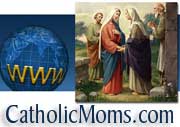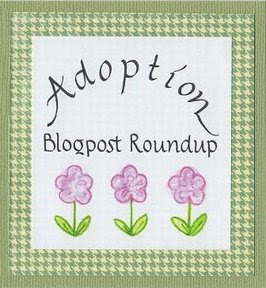
It took us three years to adopt our two foster children; our first official act as their parents was to have them baptized, so they could be a part of God’s family, too. As we got ready for the big day, we explained that they would each have new names on their baptism certificates (and, a bit later, on their newly issued birth certificates).
“Why do I get a new name?” Christopher wanted to know.
“You’re getting two new names, actually,” I told him. “We kept your first name to honor your birth family; your middle name will be ‘Robert,’ like your dad’s; and your last name will be ‘Saxton’ because you’re a part of our family now.”
“Oh.”
Clearly this answer didn’t satisfy him. I tried a different approach. “Christopher, do you know that my name changed when I became a part of your dad’s family?”
“It did?” his expression brightened. I nodded.
“And did you know that in the Bible, there are lots of examples where God changed someone’s name when he or she became part of God’s family, or agreed to do a special job for God? Abram became ‘Abraham.’ His wife Sarai became ‘Sarah.’ Jesus’ special friend Simon became ‘Peter,’ our first pope. The apostle Paul’s first name was ‘Saul.’ Each of these people had a special job to do … and each one got a new name to show that something was different about them now.”
It wasn’t until a month later, at their older sister’s baptism, that I realized what an impression this made. As the priest poured water over the little girl’s forehead, my kids leaped up and shouted, “Hurray! Our sister has a new name today!”
The priest turned, startled, then smiled. “Yes, she does. Her name is ‘Christian.’ Wouldn’t it be wonderful if all of us were so excited about it!”
Forever Families
Names are important: “Mom,” “Dad,” “Grandpa,” “Nana.” These words are powerful by association, particularly in the hearts of children. And so when it came time for us to “name ourselves” for our children, we put considerable thought to this as well. Christopher and Sarah already had already lost one set of parents; they also had two siblings that were being adopted by other families, and yet our kids were still very much attached to them. How were we going to communicate the permanent and exclusive nature of our family unit?
Forever Families
Names are important: “Mom,” “Dad,” “Grandpa,” “Nana.” These words are powerful by association, particularly in the hearts of children. And so when it came time for us to “name ourselves” for our children, we put considerable thought to this as well. Christopher and Sarah already had already lost one set of parents; they also had two siblings that were being adopted by other families, and yet our kids were still very much attached to them. How were we going to communicate the permanent and exclusive nature of our family unit?
And so, we became Christopher and Sarah’s “forever family.” It wasn’t until much later that I discovered how much fire this appellation draws in adoption circles, since the biological bond is equally permanent even when a child is raised by someone else. This was powerfully illustrated in Ann Fessler’s tribute to birthmothers, The Girls Who Went Away: The Hidden History of Women Who Surrendered Children for Adoption in the Decades Before Roe v. Wade (Penguin Press, 2006). The stories in this book reminded me that, no matter what circumstances are that led to a child being placed for adoption, and no matter how young the children were when the adoption occurred, there is a primal connection that can never be completely severed. “Mother” has been forever etched upon their hearts.
“Victim” Souls?
In TGWWA, Fessler vividly portrays what the adoption process was like forty years ago. She captures the horrific plight of the girls shipped off to “maternity homes.” We meet pushy social workers, unfeeling parents, and absentee boyfriends. The author attributes the numbers of out-of-wedlock births to a “lack of information” on one hand, and a “lack of options” on the other. (Rather than, say, a disregard for the consequences of extra-marital sex).
Adoptive parents (and adult adoptees) who read this book will find it easy to empathize with these struggling, suffering women. And yet, I couldn’t help but feel as though the book told only half the story. There was not a single story of a woman who recognized that, painful as it was, adoption was absolutely the best choice for her child. Nor do many acknowledge the debt of gratitude owed to the people who parented her child day and night; several gloss over the sacrifices made for their child with unseemly haste in their eagerness to reclaim the title of “mother.”
Most importantly, these stories illustrate more clearly than any chastity lecture ever could why the unitive and procreative aspects of sexuality cannot be separated without harming the individuals involved, and causing a great deal of anguish for all concerned. This was illustrated most poignantly by “Madeline,” who said (p.243):
I always felt like there was a huge scale and that I could never balance it. I held myself responsible [for losing my daughter]. I wanted to keep this baby. I felt powerless to keep this baby. I wanted it to be over. I wanted to go back to being a normal person. I wanted the baby out of my life. I wanted the baby. I didn’t want the baby. I think it’s that ambivalence that is so hard for people to look at and admit. People will say, “Oh, I wanted my baby with all my heart, and they took my baby from me.” And they turn themselves into a victim. Anything you get yourself into a situation like this, you have to see where you are partially responsible for it. It’s a two-way thing. I’ve been in a lot of situations like that. I’ve been in situations where it seems as though I’m the victim but in reality I’m part of the equation.
This book amply demonstrates that, even in purely secular terms, the “right” to engage in sex cannot be divorced from the responsibilities associated with it, both to one’s partner and to any life that comes from that union. However, because an authentic Catholic worldview – which reserves sexual expression to married couples on moral grounds as well as sociological ones – is missing from the book, adoption is portrayed as an unduly harsh punishment inflicted on a girl (most often by her own family), rather than a truly loving and unselfish choice made by two people who take responsibility for their actions, and who do what is necessary to give their child the stable, loving home every child deserves.
The Family Factor
In Donum Vitae (“The Gift of Life,” 1987), the Church affirms the right of every child “to be conceived, carried in the womb, brought into the world and brought up by his own parents” (par 3.) While these rights are explained in the context of the Church’s opposition to surrogate motherhood, these fundamental human rights apply equally to any child conceived (willingly or unwittingly) outside the bonds of marriage.
The Family Factor
In Donum Vitae (“The Gift of Life,” 1987), the Church affirms the right of every child “to be conceived, carried in the womb, brought into the world and brought up by his own parents” (par 3.) While these rights are explained in the context of the Church’s opposition to surrogate motherhood, these fundamental human rights apply equally to any child conceived (willingly or unwittingly) outside the bonds of marriage.
When this occurs, it is the child – not the woman, as Fessler contends – who bears the “full emotional weight of circumstances” caused by the parents’ actions, since the child is deprived of these rights long before he is born. Sadly, the author is too busy assigning blame on society in general and the girls’ parents in particular to consider the ramifications of the abortion “solution” hinted at in the subtitle of the book through the story of “Nancy I” (p.53).
[E]verytime I hear stories … about the recurring trauma of abortion, I want to say, “You don’t have a clue.” I’ve experienced both and I’d have an abortion any day of the week before I would ever have another adoption – or lose a kid in the woods, which is basically what it is. You know your child is out there somewhere, you just don’t know where.
This statement, perhaps more than any other in the book, reveals the fundamental flaw in the feminist position on sexual expression as a “right,” contraception as a “convenience,” and pregnancy as a “condition” to be cured rather than a gift to be cherished.
Is Single Parenthood the Answer?
This question is one that I’ve considered at close range. I’m related by birth or marriage to three women who have had children out of wedlock. In each case, these women decided to raise their babies on their own (with considerable assistance from grandparents). Two years later, one of these women became pregnant a second time; this time she attempted to place the child for adoption. The biological father, whose violent criminal record did not stop a judge from granting him sole custody over the Christian couple who had been chosen as the adoptive parents, thwarted her plan.
Is Single Parenthood the Answer?
This question is one that I’ve considered at close range. I’m related by birth or marriage to three women who have had children out of wedlock. In each case, these women decided to raise their babies on their own (with considerable assistance from grandparents). Two years later, one of these women became pregnant a second time; this time she attempted to place the child for adoption. The biological father, whose violent criminal record did not stop a judge from granting him sole custody over the Christian couple who had been chosen as the adoptive parents, thwarted her plan.
Unfortunately, the story does not end there. Of these three women, two quickly married men who were not their child’s biological father. Both men mistreated the children; one abused both his wife and her child. (He sued for custody to get back at the mother for leaving him, even though he was not related biologically to the child, and he very nearly succeeded in obtaining custody of her daughter because she had no medical records or police reports to confirm the abuse she and her daughter had endured.)
It is an unfortunate reality that many young women who become pregnant out of wedlock are not ready to be mothers, and are ill prepared to face the challenges of motherhood. This plays out in a variety of ways, with grandparents often caught in a no-win situation. Having offered to help their daughter raise her child, they find themselves in the uncomfortable place of feeling responsible for the child without having the power to make decisions on the child’s behalf. “I’m the mother,” their daughter reminds them … refusing to relinquish any of her “rights,” no matter how much suffering her bad choices cause both her parents and her child.
And so, the parents keep supporting, keep paying, and keep quiet … afraid that if they alienate their daughter, they may lose their grandchild as well. “At least the baby is here, where we know he’s safe,” they tell each other. It is this pressure that kept the parents of the third unwed mother in my extended family from “pressuring” their daughter into marrying the baby’s father. Despite the fact that they live together and share expenses, she just isn’t sure he’s “Mr. Right.”
And once again, the rights of the baby – to be raised in the loving embrace of both parents, within a permanent family unit – are sacrificed. For now he has his mother’s name … and we pray that, once he is old enough to understand the reason why his father left, that name will be enough.
Parenthood is inherently a life of self-sacrifice. There is no getting around it. Whether that sacrifice entails the death of a dream, or just a full night's sleep, the self-donation required in order to raise a child and turn him or her into a responsible citizen of the world is nothing short of breathtaking. I'm not sure I would have had the courage to become a parent had I known ahead of time how difficult it was going to be.
In the end, however, it's not about the sacrifice of the parent, but the needs of the child. No matter what the circumstances are that a child is brought into the world, the moment his life begins the paramount question is not, "What do I want?" but, "What does this child need?" Not "What is convenient?" but "What is in my child's best interest?"
What this book shows most clearly is that what is in the child's best interest has very little to do with what makes the parent feel good. That too is the nature of parenthood. Convenience and personal happiness is often the standard by which our culture makes decisions ... but faith urges us to embrace a higher calling.












 My StumbleUpon Page
My StumbleUpon Page



 border="0">
border="0">
















4 comments:
Great review and thought-provoking reflections!
I agree with much of your article and I most definitely agree with your last paragraph! As far as single parenting goes, however, I feel we need to accept it as a much lesser evil than abortion. I agree that the situation is far from ideal (and grandparents can certainly make all the difference in the equation) but if we return to the days when an unmarried pregnant woman was condemned and shamed by all, we increase the number of women who will seek abortion as a "solution." I always try to support the single mothers that I know for they have made a courageous decision to carry their child to term in a world that tells them that they didn't have to.
Hi, Patrice! Thanks for the comment. I agree that single parenting is a better option than abortion, which is always wrong. There are single women who make great mothers (I know of one in particular who is in the process of adopting her third child). It's important to distinguish between those mature women who are ready to parent, and those teenagers who are pushed prematurely into the role. It is this latter group that I mean to address, and for whom I would suggest that adoption may be a better option than parenting. Thanks for writing!
Great article, Heidi. We are in the adoption process right now. I've read a lot of books and you're right. We never hear from the birth mothers who KNOW they did the right thing, or from adoptees who accepted their adoption as a good thing. I'm glad I personally know both kinds of people or I might be too scared to go forward.
Post a Comment